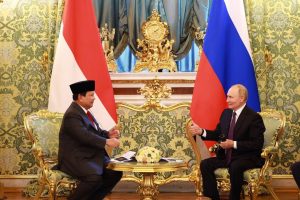Indonesia’s president-elect has expressed his hopes for continued good relations with Russia, describing the nation as a “great friend” after meeting President Vladimir Putin in Moscow earlier this week.
Speaking during a state visit on Wednesday, Prabowo Subianto said that his administration, which will take office in October, would seek to build stronger cooperation with Moscow on defense, energy, and education.
“We consider Russia as a great friend,” Prabowo said in a statement from the Indonesian Ministry of Defense that was quoted by Reuters. “I would like to continue to maintain and enhance this relationship. In our history, we remember Russia has always helped us in many aspects when we were in difficulties.” Putin responded by describing Prabowo, who is currently serving as defense minister, as “a good friend of our country.”
BenarNews reported that during a televised address linked to his talks with Putin, Prabowo said his discussions with Putin and other Russian officials had focused on possible Russian cooperation in food, energy security and education.
“I’ve been talking to some of your industrialists and we are open for more Russian participation in our economy,” he said, adding that he had also discussed the possibility of cooperation on nuclear energy development.
The Russian state news agency TASS quoted Putin as saying that Russia was ready to “further scale up supplies of agricultural products, implement investment projects in the field of energy, transport, and infrastructure.”
During a meeting with Russian Defense Minister Andrey Belousov, Prabowo also discussed the possible transfer of defense technology, with which Indonesia hopes to establish an independent defense industry – a key goal of the Indonesian government during President Joko “Jokowi” Widodo’s 10 years in office.
Prabowo’s trip to Russia comes just two months after Prabowo traveled to China, his first overseas visit after winning a landslide victory at the presidential election in February. During a meeting with leader Xi Jinping, he advanced much the same goals as during this week’s trip to Russia. In addition to affirming Jokowi’s “policy of friendship” with China, he discussed the possibility of boosting economic and security ties, and affirmed plans to boost defense industry cooperation.
Taken together, these trips offer ample evidence (if any was needed) that Indonesia’s next administration remains staunchly committed to its non-aligned position, even amid the intensifying geopolitical rivalries.
It is also part of something of a regional trend. Prabowo’s visit, his fourth to Russia since becoming defense minister in late 2019, also comes a month after Indian Prime Minister Narendra Modi’s visit to Russia in early July, and Putin’s visit to Vietnam in mid-June. Today, Malaysia’s Prime Minister Anwar Ibrahim announced that he, too, plans to meet with Putin “in a few weeks,” according to Malaysian media reports, in order to “discuss economic cooperation and position Malaysia among the countries that defend a neutral stance without being enemies with anyone.”
The fact that these four nations – all of which are viewed as actual or potential partners of the Western nations seeking to trim and contain Chinese and Russian ambitions – have so ardently welcomed, or been welcomed by, Putin suggests a couple of things.
The first is that the attempt by the U.S., the European Union, and their allies to isolate Russia since the 2022 invasion of Ukraine – and to depict that conflict as the decisive moral question of 21st-century geopolitics – has failed to gain traction in many parts of the non-Western world. This is especially the case in light of subsequent events in Gaza, which is a more salient issue in many nations, particularly Muslim-majority Indonesia and Malaysia, if less so in Vietnam and India.
The second is what it indicates how nations are approaching the growing polarization of international politics. For the most part, these moves by Indonesia, India, and Vietnam indicate a desire to maximize national agency and avoid jumping definitively into either of the two fast-coalescing international “camps” –to maintain “a neutral stance without being enemies with anyone,” as Anwar put it. Whether or not this is ultimately successful, it suggests that any attempt, either by the West or its rivals, to divide the world into hostile ideological camps will face slippery resistance across much of what was once referred to as the “Third World.”
































